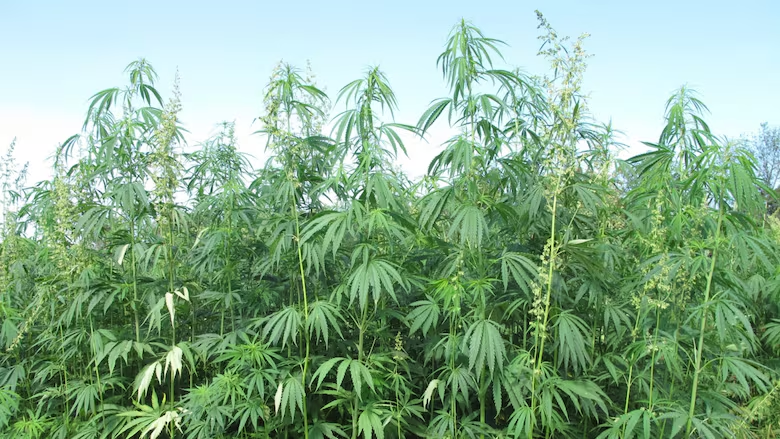Hemp production facility at former eastern Manitoba tree nursery goes bust
Manitoba government says it's owed $500K from company that struggled after supply glut

A startup company's plan to turn a tree nursery into a commercial hemp operation has gone bust.
The Manitoba government terminated its land lease last month with Botanist Organic Growers Corporation, the province confirmed on Thursday.
The company, which made no progress toward production of hemp cannabidiol, or CBD, now owes the province $500,000.
Botanist Organic Growers bought the sprawling greenhouse facility near Hadashville, Man., about 90 kilometres east of Winnipeg, from the province in 2019 for $1.43 million. The province had shut down operations at the provincially run tree nursery in 2018, saying it was losing money.
The company agreed to lease the Crown-owned land for $240,000 a year.
It aimed to hire as many as 200 people at the site of the former Pineland Forest Nursery, heralding an economic boom for the region.
But it never happened.
"Each season, it was getting more depressing," said Trudy Turchyn, the reeve of the rural municipality of Reynolds.
"You would see the facilities, the greenhouses, everything deteriorating; weeds and trees taking over. It was very sad to see because it was such a gem and had such potential."
'Bottom fell out' of market
When the Manitoba government shut down the tree nursery, which grew seedlings for the province and some for export, it had 67 greenhouses on more than 300 acres (121 hectares) of land. The province expected a search for buyers to generate significant interest.
Botanist Organic was announced as buyer in February 2019, with the company saying it planned to become the biggest producer in the world of organic hemp cannabidiol. CBD is a compound derived from hemp or cannabis that unlike THC — the psychoactive component in cannabis — doesn't get users high, and is prized for purported health benefits, including pain relief.
However, "[the] bottom fell out of the cannabis supply market shortly after," said John Pozios, a corporate finance advisor in Winnipeg. He was hired by Botanist Organic to manage issues around the Pineland site.
Oversupply made it impractical to grow hemp, or potentially cannabis, Pozios said.
The company sought alternative uses for the site. It was in talks with a number of First Nations to grow fresh produce, which would be offered to remote and northern communities where produce is expensive, he said.
The province was kept abreast of the company's plans and remained patient, said Pozios.
Last winter, Botanist Organic got into a dispute with Manitoba Hydro regarding gas supply to the property, which is now the subject of litigation, he said.
"That became actually a fly in the ointment. As we were trying to work through the dispute with Hydro, the province was becoming increasingly anxious that we weren't moving forward with the project."
Eventually, the province's patience ran out. The lease was terminated with only five days' notice for the company to cover its outstanding debts, Pozios said.

He said no assets were sold, and those on the land remain the company's property.
The provincial government said the company ran out of time.
"While the province entered into the agreement with Botanist Organic Growers Corp. (BOGC) in good faith and, in the interests of all Manitobans, it has become clear that BOGC is unable to fulfil its obligations," a spokesperson said in a statement.
The province was sympathetic to business issues during the pandemic, the statement continued, but "the company failed to provide an acceptable plan to move forward."
The lease was terminated on Sept. 28 of this year.
"Manitoba owns the land and is proceeding to conclude its dealings with BOGC after which Manitoba will be exploring new options for the site."
Produce for First Nations
Botanist Organic is hoping it can negotiate a settlement with the province regarding its overdue payments and with Manitoba Hydro concerning its litigation — and hopes to then try redeveloping the site, Pozios said.
"We have new investors who are interested in investing in the property as a social enterprise, growing produce for First Nations," he said. "There's a desperate need for more affordable, fresh produce."
Opposition NDP environment critic Lisa Naylor called on the government to partner with the municipality on next steps for the property. She feels the province was unnecessarily secretive leading up to lease's termination.
Despite numerous requests, Reynolds Reeve Turchyn said the municipality got no information about the producer's struggles until it learned of the terminated lease this month.
"Everybody is disappointed" the project isn't going through "because it was going to be an exciting new lifeline for the community," she said.
Turchyn said she wishes the province imposed stricter timelines on the initial buyer, so the property wasn't sitting dormant for years.


